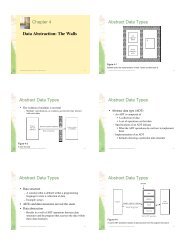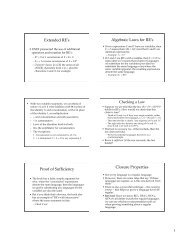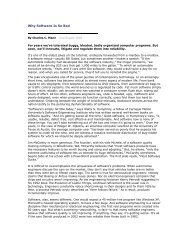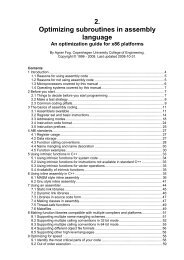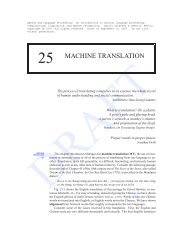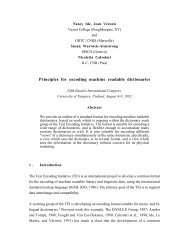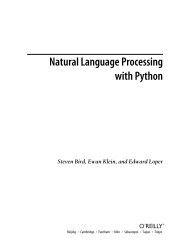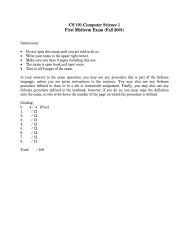Advanced Java Topics CS102 Sections 51 and 52 Marc Smith and ...
Advanced Java Topics CS102 Sections 51 and 52 Marc Smith and ...
Advanced Java Topics CS102 Sections 51 and 52 Marc Smith and ...
Create successful ePaper yourself
Turn your PDF publications into a flip-book with our unique Google optimized e-Paper software.
Chapter 9 (continued)<br />
Abstract Classes<br />
<strong>Advanced</strong> <strong>Java</strong> <strong>Topics</strong><br />
<strong>CS102</strong> <strong>Sections</strong> <strong>51</strong> <strong>and</strong> <strong>52</strong><br />
<strong>Marc</strong> <strong>Smith</strong> <strong>and</strong> Jim Ten Eyck<br />
Spring 2007<br />
• Example<br />
– CD player <strong>and</strong> DVD player<br />
• Both involve an optical disk<br />
• Operations<br />
– Insert, remove, play, record, <strong>and</strong> stop such discs<br />
© 2006 Pearson Addison-Wesley. All rights reserved 9 B-1<br />
© 2006 Pearson Addison-Wesley. All rights reserved 9 B-2<br />
Abstract Classes<br />
Abstract Classes<br />
Figure 9-8<br />
CDP <strong>and</strong> DVDP have an abstract base class GDP<br />
• Abstract classes<br />
– An abstract class is used only as the basis for subclasses<br />
• It defines a minimum set of methods <strong>and</strong> data fields for its<br />
subclasses<br />
– An abstract class has no instances<br />
– An abstract class should, in general, omit<br />
implementations except for the methods that<br />
• Provide access to private data fields<br />
• Express functionality common to all of the subclasses<br />
© 2006 Pearson Addison-Wesley. All rights reserved 9 B-3<br />
© 2006 Pearson Addison-Wesley. All rights reserved 9 B-4<br />
Abstract Classes<br />
<strong>Java</strong> Interfaces Revisited<br />
• Abstract classes (Continued)<br />
– A class that contains at least one abstract method must<br />
be declared as an abstract class<br />
– A subclass of an abstract class must be declared<br />
abstract if it does not provide implementations for all<br />
abstract methods in the superclass<br />
• A <strong>Java</strong> interface<br />
– Specifies the common behavior of a set of classes<br />
– Common uses<br />
• Facilitate moving from one implementation of a<br />
class to another<br />
– A client can reference a class’s interface instead<br />
of the class itself<br />
• Specify behaviors that are common to a group of<br />
classes<br />
© 2006 Pearson Addison-Wesley. All rights reserved 9 B-5<br />
© 2006 Pearson Addison-Wesley. All rights reserved 9 B-6
<strong>Java</strong> Interfaces Revisited<br />
• Inheritance can be used to define a subinterface<br />
• The <strong>Java</strong> API provides many interfaces <strong>and</strong><br />
subinterfaces<br />
– Example: java.util.Iterable<br />
• An iterator is a class that provides access to another<br />
class that contains many objects<br />
The ADTs List <strong>and</strong> Sorted List<br />
Revisited<br />
• BasicADTInterface<br />
– Can be used to organize the commonalities between the<br />
ADT list <strong>and</strong> the ADT sorted list<br />
– ListInterface<br />
• A new interface based on BasicADTInterface<br />
© 2006 Pearson Addison-Wesley. All rights reserved 9 B-7<br />
© 2006 Pearson Addison-Wesley. All rights reserved 9 B-8<br />
Implementation of the ADT<br />
Sorted List That Used the ADT<br />
List<br />
• Operations<br />
– createSortedList()<br />
– isEmpty():boolean {query}<br />
– size():integer {query}<br />
– sortedAdd(in newItem:ListItemType) throw<br />
ListException<br />
– sortedRemove(in anItem:ListItemType) throw<br />
ListException<br />
– removeAll()<br />
– get(in index:integer) throw<br />
ListIndexOutOfBoundsException<br />
– locateIndex(in anItem:ListItemType):integer<br />
{query}<br />
Implementations of the ADT<br />
Sorted List That Use the ADT List<br />
• A sorted list is a list<br />
– With an additional operation, locateIndex<br />
• A sorted list has a list as a member<br />
© 2006 Pearson Addison-Wesley. All rights reserved 9 B-9<br />
© 2006 Pearson Addison-Wesley. All rights reserved 9 B-10<br />
<strong>Java</strong> Generics: Generic Classes<br />
Generic Wildcards<br />
• ADT developed in this text relied upon the use of<br />
Object class<br />
• Problems with this approach<br />
– Items of any type could be added to same ADT instance<br />
– ADT instance returns objects<br />
• Cast operations are needed<br />
• May lead to class-cast exceptions<br />
• Avoid this issues by using <strong>Java</strong> generics<br />
– To specify a class in terms of a data-type parameter<br />
• Generic classes are not necessary related<br />
• Generic ? wildcard<br />
– St<strong>and</strong>s for unknown data type<br />
• Example<br />
public void process(NewClass temp)<br />
{<br />
System.out.println("getData() => " +<br />
temp.getData());<br />
} // end process<br />
© 2006 Pearson Addison-Wesley. All rights reserved 9 B-11<br />
© 2006 Pearson Addison-Wesley. All rights reserved 9 B-12
Generic Classes <strong>and</strong> Inheritance<br />
Abstract Classes<br />
• You can use inheritance with a generic class or<br />
interface<br />
• Method overriding rules<br />
– Declare a method with the same parameters in the<br />
subclass<br />
– Return type is a subtype of all the methods it overrides<br />
• It is sometimes useful to constrain the data-type<br />
parameter to a class or one of its subclasses or an<br />
implementation of a particular interface<br />
– To do so, use the keyword extends<br />
Figure 9-10<br />
Sample class hierarchy<br />
© 2006 Pearson Addison-Wesley. All rights reserved 9 B-13<br />
© 2006 Pearson Addison-Wesley. All rights reserved 9 B-14<br />
Generic Methods<br />
Iterators<br />
• Method declarations can also be generic<br />
– Methods can use data-type parameters<br />
• Generic methods are invoked like regular nongeneric<br />
methods<br />
• Example<br />
public static
Summary<br />
• Early (static) binding: compiler determines at<br />
compilation time the correct method to invoke<br />
• Late (dynamic) binding: system determines at<br />
execution time the correct method to invoke<br />
• When a method that is not declared final is<br />
invoked, the type of object is the determining<br />
factor under late binding<br />
• Generic classes enable you to parameterize the<br />
type of a class’s data<br />
• Iterators provide an alternative way to cycle<br />
through a collection of items<br />
© 2006 Pearson Addison-Wesley. All rights reserved 9 B-19



